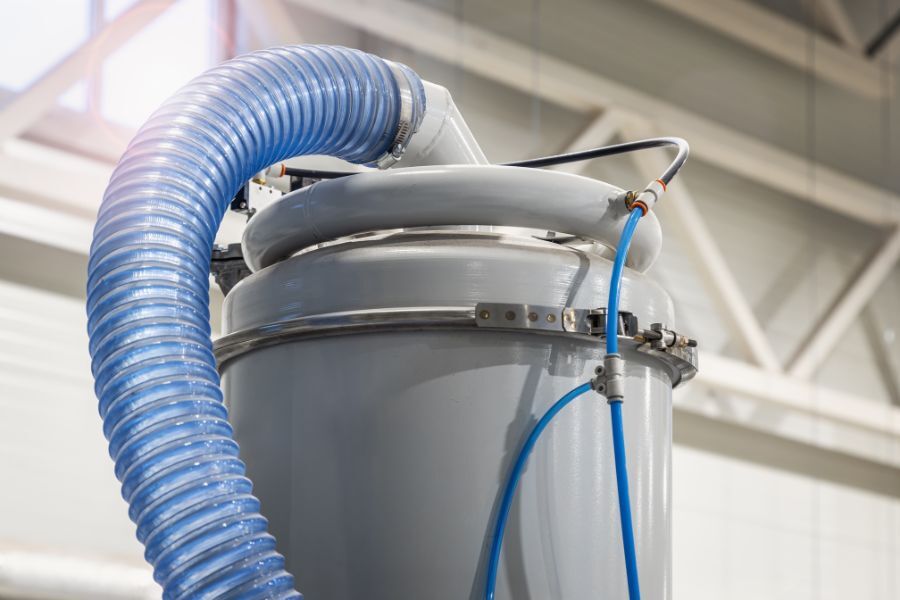
Benefits and drawbacks of industrial filtration systems
We’ve discussed some of the main industrial filtration systems used by treatment facilities and plant operators, but what are their benefits and potential drawbacks? Let’s dive a little deeper into liquid and air filters. Learn more about the importance of choosing the right filtration system for your industrial needs.
Liquid Filters and Their Relevance in Home and Industrial Applications
Starting with liquid filters, these are used to separate suspended solids from a fluid stream. To do the job, they use a physical barrier called the filter medium. You’ll find liquid filters in industries like food and beverage manufacturing, bioprocessing, pharmaceuticals, medical facilities, and wastewater treatment. You can also find small-scale filters such as bag filters and cartridge filters in some homes, offices, and laboratories.
Many homeowners are also turning to a home water filtration system to ensure clean, safe drinking water. These systems use similar filtering technologies as industrial filters and can be scaled to suit residential use. A whole house water filter system, for example, treats all water entering the home, providing purified water for drinking, cooking, bathing, and more.
Liquid filters are important because they help maintain the quality of the liquid and improve the efficiency of downstream processes. However, they can be expensive, and the maintenance and replacement of filters will also add up.
Advantages of liquid filters:
- Effective in removing impurities, contaminants, and solids from liquids.
- Improves the quality of the liquid.
- Increases the efficiency and lifespan of downstream processes.
- Can be adapted for use in a water filtration system for home to ensure safer, better-tasting tap water.
Disadvantages:
- Can be expensive, especially for large scale filtration.
- Maintenance and replacement of filters can be costly.
- May not be effective in removing all impurities from the liquid.
- Homeowners may find it difficult to select the right home water filtration system without expert guidance.
Air filtration systems in Industrial and Residential Use
Industrial air and particulate filtration systems are a must-have for industrial manufacturers to ensure air quality, protect workers from inhaling hazardous pollutants, and keep machinery running smoothly. They’re great at removing solid particles, dust, and debris from the air, which improves air quality and reduces respiratory problems. They’re also used to remove solids or particulates from gas streams.
Advantages:
- Protects workers from inhaling hazardous pollutants in the air.
- Effective in removing solid particles, dust, and debris from the air and gas streams.
- Improves air quality and reduces respiratory problems.
- Increases the efficiency and lifespan of machinery by preventing air pollutants from getting into the facility’s equipment.
- Helps ensure healthier indoor air for those using a whole house water filter system combined with air purifiers in residential environments.
Disadvantages:
- Can be costly, especially for commercial air filtration
- Hidden maintenance costs
- Filters need to be regularly changed – old filters can actually worsen air quality
- May not be effective in removing all particulates from the air or gas stream, especially when filtering smaller pollutants
Understanding the Advantages and Disadvantages of Filtration
When exploring the advantages and disadvantages of filtration, it’s important to consider both the short-term benefits and the long-term maintenance involved. Whether you’re investing in an industrial solution or a water filtration system for home, choosing the right technology and maintaining it properly is key to effective performance.
Filtration offers clear benefits—cleaner air, safer water, and better equipment efficiency—but costs, upkeep, and limitations in effectiveness must also be evaluated.
So, there you have it, a quick rundown of the benefits and drawbacks of liquid and air filters in industrial filtration systems! Of course, there are many other options we’d love to chat to you about—from industrial applications to choosing the best home water filtration system for your family. Give us a call on 1-800-367-4180 (toll-free) to find out more or check out our range of filters online.
As your specialist industrial filtration systems supplier in Canada, we’re here to help you choose, install, maintain, and monitor a variety of equipment—including helping you select the ideal whole house water filter system. And to answer questions about things you’ve previously tried gone wrong. So, contact us now!
